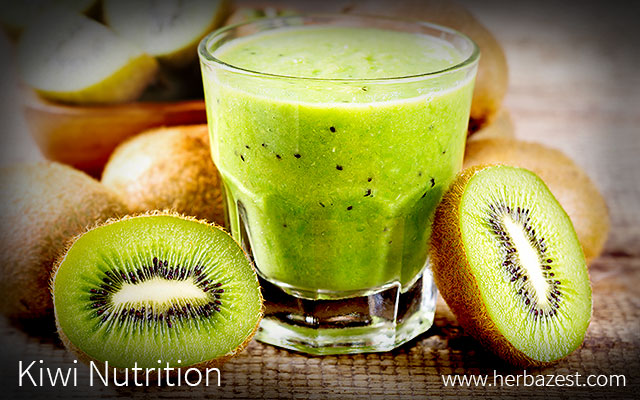Like many fruits and vegetables, kiwi contains essential nutrients and supporting compounds that provide many health benefits. Some kiwi nutrients are of greater value than others, and can be found in various amounts depending on the variety and preparation.
Essential Nutrients in Kiwi
Many of the health benefits sought out in kiwi fruit come from its vitamins and minerals, which are essential for adequate functioning of the body as a whole.
Vitamins
Undoubtedly the presence of vitamin C in kiwi is the main contributor to its nutritional benefits. The average vitamin C (ascorbic acid) content in a kiwi is 92.7 mg per 100 g, enough to cover the adult daily requirements for both men (90 mg) and women (75 mg). Vitamin C also benefits the immune system by strengthening the natural defenses of the body.
While vitamin C certainly accounts for most of the nutritional value of kiwi, the fruit also contains significant levels of vitamin E. Although vitamin E was believed to be found largely in kiwi seeds, recent research has discovered that it is also available in the fruit's flesh. The amount of vitamin E in 100 g of kiwi is 1.46 mg, which contributes about 18% of the 15 mg recommended daily allowance of this essential nutrient.
The vitamin content of kiwi can be deciphered by looking at what part of the fruit is used and how the fruit is handled. Levels of vitamin C and vitamin E can be lowered due to length and conditions of storage, ripening, and processing.
Higher levels of vitamin C can be found in the inner and outer flesh of kiwi compared to the core and skin. Vitamin E, however, is reportedly found in higher levels in the kiwi skin compared to the flesh.
Both vitamins C and E are powerful antioxidant nutrients, and they play an important role aiding blood circulation in individuals with cardiovascular disease.
Other Essential Nutrients
Along with providing strong vitamin supplementation, kiwi fruit nutrition offers essential dietary minerals. The levels of potassium in kiwi are among the highest in nature, with 312 mg per 100 g, only surpassed by banana (350 mg per 100 g). This great amount of potassium adds to the nutritional value of kiwi fruit and contributes to the 4,700 mg recommended daily intake for this mineral.
A study published in Advances in Food Nutrition Research (2013) examined recent research regarding kiwi fruit's effects on cells, animals, and humans, and concluded that kiwi consumption can increase the body's ability to absorb and retain iron, calcium, phosphorus, and magnesium.
Kiwi Supporting Compounds
Dietary Fiber
A commonly-known nutrition fact is the high content of fiber in kiwi; however, taking into consideration that 90% of kiwi's weight is water, and only 2 - 3% of the fruit is fiber, it is not such an exceptional source of fiber. Nevertheless, kiwi fiber is believed to contribute to its laxative effect, making kiwi beneficial for improving bowel movements. A study published in the World Journal of Gastroenterology (2007) found that the fiber in kiwi was effective in relieving constipation.
Protein
While kiwi is not considered a major source of protein, it contributes with 1.14 grams per 100 g. The main soluble protein in kiwi is actinidain, which is primarily found in the flesh. The nutritional value of actinidain may help with the digestive effects of kiwi by stimulating the breakdown of proteins in the stomach and small intestine. A study published in the Journal of Agricultural and Food Chemistry (2010) found that kiwi extract with actinidain may improve the digestion of some, but not all, food proteins.
Actinidain is also considered to provide some of kiwi benefits, as studies have suggested its potential for the treatment of irritable bowel syndrome (IBS) and diabetic foot ulcers.
The actinidain in kiwi is also used for culinary purposes, often in the process of cheese-making or in a kiwi fruit marinade used to tenderize meat. However, the actinidain in kiwi could be harmful to people with a specific sensitivity, since some studies have identified it as a major human allergen.
Many kiwi nutrition facts are still being discovered through research, but what is known is that kiwifruit is a great source of vitamins C and E, potassium, iron, calcium, phosphorus, and magnesium. While kiwi may not be the best source of protein and fiber, these kiwi components, as part of a balanced diet, contribute to human nutrition.
Sources
- International Atomic Energy Agency, Analysis of Kiwi Fruit (Actinidia deliciosa) by Energy Dispersive X-Ray Fluorescence Spectra
- Journal of the Academy of Nutrition and Dietetics, What is Potassium?
- National Institutes of Health, Vitamin C Fact Sheet for Consumers | Vitamin E Fact Sheet for Health Professionals
- Nutritional Benefits of Kiwifruit, pp. 33-48, 60-67
- World Journal of Gastroenterology, Increasing dietary fiber intake in terms of kiwifruit improves constipation in Chinese patients, 2007
- USDA Nutrient Database, Kiwifruit, green, raw
- Journal of Agricultural and Food Chemistry, Actinidin Enhances Gastric Protein Digestion As Assessed Using an in Vitro Gastric Digestion Model, 2010
- Advances in Food and Nutrition Research, Kiwifruit and mineral nutrition, 2013
- American Heart Association, Potassium




